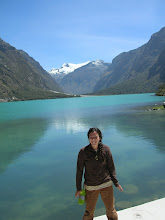
Ancashinos hold onto their traditional roots and maintain the antiguity of their culture. I feel that this traditionalism is a great strength of the culture and integrity of Ancash, but it also makes people a lot more closed off and suspicious to outsiders than other regions. In Ancash, you must gain respect from your community before you can be taken seriously as an individual. To gain respect, you need to demonstrate your continued presence, politeness, tolerance, willingness to learn the culture (ahem, Quechua) etc. It is very difficult to explain the

difficulties of integrating into a community in Ancash to someone who has not experienced it. It is one of the many things in the world that can only be understood by coming here, staying here as someone who is not a tourist, and experiencing it firsthand.
Once you have finally been accepted by your community, the next step of the process is trying to explain that you are not there as a source of money for the community. Generally in most parts of the developing world, any gringo traveler will be looked at as a source of money or resources. Face it, we have money, we are privileged, and we are most certainly richer (monetarily) than the people in the local communities that we will work in.

Another facet to add to this perspective is the history of NGO’s and other aid organizations here in Ancash. On May 30, 1970, a 7.8 magnitude earthquake caused the north side of the glacier of Huascaran to fall. This fall created a massive mudslide that killed 30,000 Yungainos and completely buried the city of Yungay, in addition to destroying many other small campesino communities in its trajectory. In response to the disaster, developing countries sent slews of aid to Ancash to help the population recover from their tragedy. Since this time, Ancash has been host to tons of different organizations, ranging from charities to

religious groups to NGO’s. Many of these organizations came to Ancash giving away tons of money and resources, and asking for no input from the local communities. 40 years later, Ancash is stuck in a rut of expectations; expectations that any development organization is there to provide them something of monetary value, and expect little or no effort from them. Now as organizations make motions to promote sustainability with their work, which is the true root of development, they are asking for participation and effort from the communities. This effort generally comes from participating in work events, attending workshops, going to meetings and attending classes. For many people in Ancash, this is simply asking too much, and they are unwilling to participate in anything that asks for their time. Unfortunately, without the active participation of the communities and community leaders a development project simply turns into a source of charity and welfare, which here in Ancash has not led to improving the situation of local communities, but to the degradation of their organizational strength.
As an individual representing an organization, this can be a huge road block in getting anything started. Up until now, I have had a great deal of trouble trying to organize community members to come to classes, meetings etc. Many people are simply uninterested or do not see the value in investing their time if they are not going to receive something tangible. After 8 months of living and being here in Huashao, I am finally making advances into organizing members of the community. At first, I was attending meetings of an NGO called World Vision, to see how they organized community members. After attending about 7 unsuccessful meetings, I realized that World Vision, an NGO that has worked here for about 4 years, also has a great deal of trouble organizing community members. After working in the

community for more time, I realized that the fault of the matter was not only the lack of participation from the community, but was in itself World Vision, due to their lack of professionalism, bad staff and huge faults in following through with promises. In the past few months, I have been working very closely with the community authorities (who before were seemingly uninterested to work with me) and we are designing projects, finding resources, and beginning classes together. Although Ancash presents plenty of road blocks, it is rewarding once you finally break through them. I have 1 year and 4 months to go, and I am looking forward to finally working with the adults of the community and reaching steps to promote the sustainable development of Huashao. Good things are planned for the next few weeks…….Hey there light at the end of the tunnel.

that is awesome. i'm sure you didn't know going into it what kind of challenges you would face, though you surely knew there would be some, but i am glad you are overcoming them. i am blessed to have a good friend like you who cares enough for strangers to try to help them, even when at first they say they don't want it! cheers Jess...that is great!
ResponderEliminar